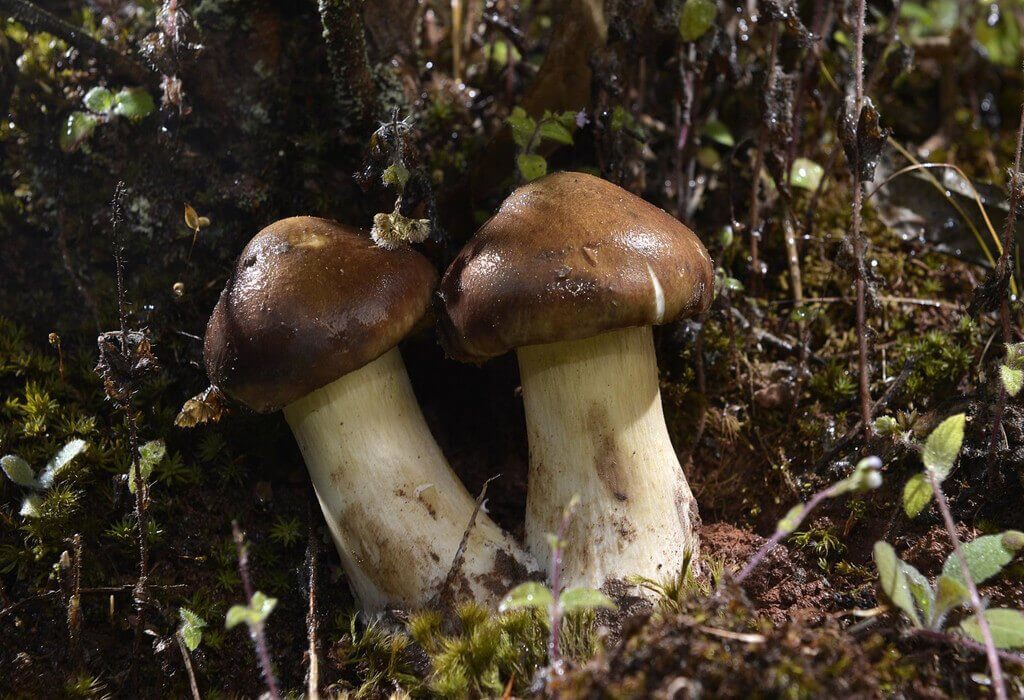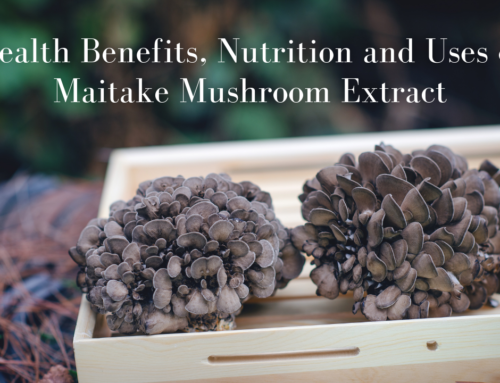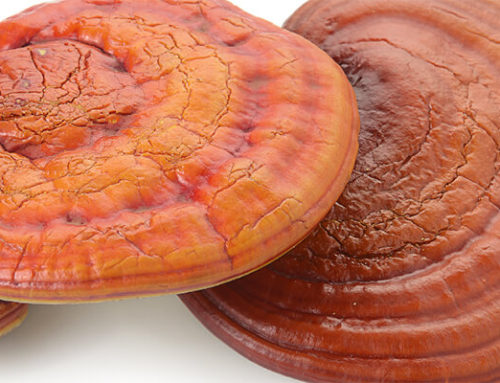-
What is turkey tail extract?
Yunzhi mushrooms, also known as “turkey tails”, have very recognizable characteristics. It may be named after a localized feature of the only forest fungus named after a bird, which resembles a turkey tail.
Yunzhi is one of the fungi with the most medicinal value. Its fruiting bodies contain an anticancer substance. The bacterial medicine has the curative effect of removing dampness, resolving phlegm, curing lung diseases, treating chronic bronchitis, persistent chronic hepatitis and the like. Yunzhi can be used as a drug for liver cancer immunotherapy. Both the polysaccharide extracted from mycelium and the polysaccharide extracted from the fermentation broth have strong tumor suppressor properties. Yunzhi is also a fungus with a variety of metabolites, including protease, peroxidase, amylase, laccase and leatherase, etc., and has a wide range of economic uses.
Yunzhi extract is extracted from the fruit body of Coriolus versicolor (L. exFranch.) Quel. (Polystictus versicolor (L.) Fronch.), a fungus of the genus Coriolus genus of Polyporaceae. It is rich in protein, fat, polysaccharide, polysaccharide peptide, glucan, lignin, amino acid and various inorganic salts, as well as various enzymes such as protease, peroxidase, amylase, laccase and leatherase. It has the functions of anti-tumor, analgesia, treatment of chronic hepatitis B, hypolipidemic and anti-atherosclerosis, anti-oxidation, anti-aging, invigorating Qi and detoxifying, and in vitro antimicrobial activity.
-
Chemical composition of Yunzhi extract
Yunzhi is rich in protein, fat, polysaccharide, polysaccharide peptide, glucan, lignin, amino acid and various inorganic salts, as well as various enzymes such as protease, peroxidase, amylase, laccase and leatherase .
- Steroids: At present, five steroids have been isolated from Yunzhi, namely ergosterol-7,22-diene-3β-palmitate, ergosterol-7,22-diene-3β -alcohol, ergosterol-7-ene-3β,5α,6β-triol, ergosterol-7,22-diene-3β,5α,6β-triol, ergosterol peroxide.
- Triterpenoids: Betulinic acid, a terpenoid, was isolated from Yunzhi.
- Organic acids: At present, 6 organic acids have been isolated from Yunzhi, which are 4-hydroxybenzoic acid, 3-methoxy-4-hydroxybenzoic acid, and 3,5-dimethoxy-4-hydroxybenzene. Formic acid, 2-furanic acid, niacin and oxalic acid.
- Alkaloid: 2-cyanoethylformamide is obtained by separating from Yunzhi.
- Glucitol: Yunzhi contains 2,3,4,6-tetra-O-methyl, 2,4,6-trichloroethylene-O-methyl, 2,3,4-trichloroethylene- O-methyl, 2,3,6-trichloroethylene-O-methyl, 2,4-dichlorobenzenesulfonamide-O-methyl, 2,3-dichlorobenzenesulfonamide-O-methyl-D- Glucitol 6 small molecular substances.
- Proteins: Yunzhi contains oxalate decarboxylase, blood protein, extracellular peroxidase, laccase, polyphenol oxidase, lignin peroxidase, polygalacturonase, superoxide dismutase Enzymes 8 kinds of protein compounds.
- Esters: 1,2,3-triolein was isolated from Yunzhi.
- Glycopeptides: Yunzhi glycopeptide is a fungal polysaccharide containing polypeptides, and its polysaccharide part can be hydrolyzed into five monosaccharides: galactose, glucose, mannose, xylose and arabinose; its polypeptide part is composed of aspartic acid. It is composed of 18 kinds of amino acids mainly including acid, glutamic acid and serine. Yunzhi glycopeptide is a glucan composed of α(1→4) and β(1→3) glycosidic bonds. The monosaccharide composition and molar ratio of Yunzhi glycopeptide is n(glucose):n(D-mannose):n(galactose):n(xylose)=1:0.0074:0.0067:0.0178, and contains 15% protein .
-
Pharmacological effects of Yunzhi extract
- Decreased transaminase Yunzhi polysaccharide can basically recover the glycogen reduction and high alanine transaminase phenomenon caused by CD4-induced toxic hepatitis in mice.
- Improve the immune function of the body Yunzhi polysaccharide can enhance the phagocytosis of mouse peritoneal macrophages, and has an antagonistic effect on spleen atrophy caused by cyclophosphamide. Yunzhi polysaccharide and filtrate polysaccharide can shrink the thymus gland and increase the weight of the spleen.
- Anti-atherosclerosis experiments have shown that Yunzhi polysaccharide can effectively inhibit the formation and development of atherosclerotic plaques.
- Improve memory function Yunzhi polysaccharide can improve the learning and memory function of mice and rats. Yunzhi polysaccharide can enhance the hypnotic effect of pentobarbital, and Yunzhi polysaccharide peptide also has a certain sedative effect, which can inhibit the pain response of mice, but the effect is slow and the duration is long.
- Other effects Yunzhi glycopeptide has analgesic effect; Yunzhi polysaccharide can effectively scavenge free radicals, induce the synthesis of SOD and GSH, reduce NOS activity and NO content, enhance the body’s antioxidant capacity, reduce MDA content and stabilize mitochondria The structure of the membrane is complete and has a protective effect on experimental liver injury; Yunzhi polysaccharide has antioxidant activity; Yunzhi polysaccharide has anti-aging effect, and its mechanism of action is related to improving the body’s immune response and enhancing the body’s removal of lipid peroxides; Yunzhi Ganoderma lucidum polysaccharide has no bacteriostatic effect on Staphylococcus aureus, Escherichia coli, Salmonella and Pseudomonas aeruginosa. At 1% concentration, Yunzhi polysaccharide has a certain bacteriostatic effect on Escherichia coli and Salmonella.
-
Anticancer pharmacology of Yunzhi extract
- Yunzhi has inhibitory effect on cervical cancer U14, mouse sarcoma S180, Ehrlich ascites cancer, lymphocytic leukemia L7212, leukemia P388, adenocarcinoma 755 and other experimental animal tumors. The extract of Yunzhi was administered to mice 10 days before tumor transplantation, and it showed obvious tumor-suppressive effect on subcutaneously transplanted mouse ascites sarcoma S180 on the 12th day after tumor transplantation; but on the 22nd day after tumor transplantation , the tumor inhibitory effect was greatly weakened.
- The 200mg/kg dose of Yunzhi glycoprotein (PSK) obtained from Yunzhi has an inhibition rate of 70.2% to 77.5% on mouse sarcoma S180, and a tumor reduction rate of 50% to 57%. Oral or intraperitoneal injection of Yunzhi glycoprotein can prolong the survival period of AH-13 rats with liver cancer ascites. Studies have shown that oral administration of Yunzhi glycopeptide (PSP) and Yunzhi glycoprotein at 2.5g/kg each for 28 consecutive days has a significant inhibitory effect on human nasopharyngeal carcinoma transplanted in nude mice, and the inhibition rates are 77.2% and 63.2%, respectively. %; No changes in body weight and blood system were observed at the dose that inhibited tumor growth.
- Yunzhi polysaccharide (Copolang) and Yunzhi glycoprotein almost show the same antitumor activity. Yunzhi polysaccharide has obvious inhibitory effect on the tumor of experimental animals, mainly inhibiting the metastasis of tumor cells in lymph nodes. Yunzhi polysaccharide has a certain inhibitory effect on mouse sarcoma S180 and mouse cervical cancer in vivo. In particular, it can inhibit animal tumors such as liver cancer AH-7974, leukemia L1210, leukemia P388 and adenocarcinoma 755, which are resistant to alkylating agents. Yunzhi polysaccharide has inhibitory effect on Yoshida sarcoma cells, liver cancer AH-13 cells, liver cancer AH-130 cells and Ehrlich ascites cells in vitro. Ehrlich ascites carcinoma and sarcoma cells of mice treated with Yunzhi polysaccharide were inoculated into mice, and on the 21st day, there was generally no tumor growth except for individual mice with small tumor growth. At this time, the second tumor was carried out. Compared with the control group, the tumor inhibition rate of the drug group was about 90%.
- The polysaccharide (ATSO) in Yunzhi has obvious inhibitory effect on mouse sarcoma S180, lung cancer 7432, Ehrlich ascites carcinoma, N-F sarcoma and other solid tumors. It also has inhibitory effect on spontaneous breast cancer in mice. The inhibition rate of Swiss mouse sarcoma S180 was 99.3%, the inhibition rate of mouse lung cancer was 77.2%, and the inhibition rate of male and female Shiono carcinoma was 70.7% and 69.2%, respectively.
- The mycelial polysaccharide (Coriolan) of Yunzhi in vitro has stronger anti-cancer effect, not only higher than the polysaccharide in Yunzhi, but also higher than the polysaccharide in Ganoderma lucidum and Polyporus chinensis. The inhibition rate of mouse sarcoma S180 was 99.9%, the inhibition rate of mouse lung cancer was 80.9%, and the inhibition rates of male and female Shiono carcinoma were 82.1% and 76.4%, respectively. In athymic hairless mice, when Coriolan 100mg/kg was injected, the anticancer effect was not obvious, and only 20% of the mice had prolonged life. The polysaccharide obtained from the extract of Basidiomycetes Coriolus has antitumor pharmacological activity.
- The combination of Yunzhi glycoprotein and mitomycin can inhibit the growth of tumor in mice, improve the survival time, and restore the suppressed immune function. The effect of the combination is more significant than that of the two drugs alone. Combined administration of Yunzhi glycoprotein and doxorubicin in tumor-bearing mice can inhibit tumor growth, improve mouse survival rate and restore suppressed immune function.
-
What is Yunzhi Polysaccharide?
Yunzhi polysaccharide is the main active ingredient in Yunzhi extract: the molecular weight is above 1.3×10 6 , it is glucan containing β-glycosidic bond, and it is measured as β(1→3) and β(1→6 ) glycosidic bond, the main active ingredient of Yunzhi extract is Yunzhi polysaccharide. Yunzhi Polysaccharide The polysaccharides extracted from Yunzhi mycelium and fermentation broth have extremely strong inhibitory activity against cancer cells.
The main active ingredient of Yunzhi is Yunzhi polysaccharide. The polysaccharides extracted from Yunzhi mycelium and fermentation broth have very strong inhibitory activity against cancer cells. The polysaccharide of Yunzhi mycelium is protein-containing glucan, while the polysaccharide extracted from the fermentation broth does not contain protein. The inhibitory rate of the extract on mouse sarcoma 180 and Ehrlich cancer was 80% and 100%, respectively.
The anti-tumor effect, immune-enhancing effect and liver-protecting effect of Yunzhi polysaccharide have been widely used in clinical practice.
The main active ingredient in Yunzhi is Yunzhi polysaccharide. Yunzhi polysaccharide has immune regulation function and is a good immune enhancer. It can enhance the function and recognition ability of immune cells, and increase the amount of IgM. Yunzhi polysaccharide also has liver protection and protection. It can significantly reduce serum transaminase, and has obvious repairing effect on liver tissue lesions and liver necrosis.
- Improve the immune function of the body: The polysaccharide of Yunzhi bacteria can enhance the phagocytosis of mouse peritoneal macrophages. Yunzhi polysaccharide (PSK) has a certain therapeutic effect on the immunocompromised mice caused by one-time irradiation with 60Co 200γ. It can significantly increase the serum lysozyme content and spleen index of irradiated mice, which is considered to have a promoting effect on the non-specific immune function of macrophages.
- Anti-tumor effect: Yunzhi polysaccharide (PSK) has inhibitory effect on sarcoma S180, leukemia L1210 and adenocarcinoma AI755.
- Anti-atherosclerotic effect: Experiments show that Yunzhi polysaccharide (PSK) can effectively inhibit the formation and development of atherosclerotic plaques.
- Effects on the central nervous system: Yunzhi polysaccharide (PSK) can improve the learning and memory function of mice and rats, and has a significant improvement effect on the learning and memory impairment of scopolamine-induced rats.
Yunzhi polysaccharide has remarkable efficacy and high medicinal value, and can be used as raw materials for various medicines, health products and functional foods.
-
What is Yunzhi Glycopeptide?
Yunzhi glycopeptide from the Polyporaceae plant Yunzhi (Coriolus versicolor L.ex.Fr.) Quel. High molecular glycopeptide polymer extracted from the mycelium of (strain Cov-1). Nourishes the essence, strengthens the spleen and nourishes the heart. It has a certain protective effect on cellular immune function and blood picture. For esophageal cancer, gastric cancer and primary lung cancer patients with Qi and Yin deficiency, heart and spleen deficiency caused by radiotherapy and chemotherapy.
-
Anti-aging effect of Yunzhi glycopeptide
In recent years, scholars at home and abroad have conducted in-depth research on the anti-aging pharmacological effects and mechanism of Yunzhi glycopeptides, and have confirmed the good effects of Yunzhi glycopeptides on anti-aging from the aspects of cellular immunity and humoral immunity.
- Recovery of cellular immune disorders Yunzhi glycopeptide can significantly promote the proliferation of lymphocytes induced by ConA, and restore the proliferation level of aged lymphocytes to a level close to that of young ones. Yunzhi glycopeptide has obvious recovery effect on mixed lymphocyte culture reaction (MLR) stimulated by allotype and spontaneous proliferation of spleen cells.
- Recovery of humoral immune disorder Humoral immune disorder is manifested as a decrease in the ability to produce antibodies and a decrease in antibody-forming cells. Yunzhi glycopeptide can significantly increase the production of single antibody-forming cells in splenocytes.
-
Anti-aging mechanism of Yunzhi glycopeptide
- Yunzhi glycopeptide can restore the production of IL-2, thereby activating a series of immune-enhancing functions such as T cells, which will undoubtedly play a good role in anti-aging.
- Yunzhi glycopeptide can significantly increase the activity of DNA polymerase in spleen cells, thereby promoting cell proliferation and division, which is the second anti-aging mechanism of Yunzhi glycopeptide.
- The modern “aging free radical theory” believes that the imbalance of free radicals is an important factor for aging. Yunzhi glycopeptide has inhibitory effects on the production of oxygen free radicals and erythrocyte lipid peroxidation, and can reduce the production of reactive oxygen species in peritoneal macrophages. The anti-aging effect of Yunzhi glycopeptide is also clarified from the cellular level.
- The “cell aging theory” believes that the end of the cell passaging function is the death of the body. Yunzhi glycopeptide can promote DNA synthesis and prolong the ability of cell division in vitro, thereby delaying aging.
The above is the detailed introduction of Yunzhi extract(turkey tail extract) that we bring to you today. If you like this post, please forward it to your friends.
Xi’an Herb Bio is a professional supplier of natural ingredient, able to provide customers with a wide variety of products to meet your needs. Friends who are interested in Yunzhi extract(turkey tail extract) , please click the link below to contact us for more relevant information.
Need Yunzhi extract(turkey tail extract)? Please contact Xi’an Herb Bio!






Leave A Comment